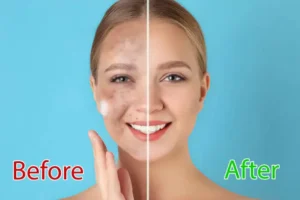Skin Whitening Tips 2025?
In 2025, the pursuit of a brighter, more even complexion has evolved into a safe and well-researched area of skincare. While traditional methods often involved harsh chemicals or procedures, today’s approach focuses on achieving brighter skin using scientifically-backed ingredients and techniques that support long-term skin health.
It’s important to note that the idea of “whitening” doesn’t necessarily mean achieving a dramatically lighter shade, but rather an even skin tone and the reduction of dark spots, pigmentation, and discoloration.
Skin whitening is not just about lightening the skin but enhancing its natural radiance. This section will focus on how skin whitening has evolved and why understanding safe practices in 2025 is crucial.
Science of Skin Whitening
Before diving into skin whitening techniques, it’s essential to understand how our skin works and what causes discoloration.
Melanin Production: The color of our skin is determined by the pigment called melanin. The more melanin produced, the darker the skin. However, overproduction of melanin, due to sun exposure, hormonal changes, or skin irritation, can lead to uneven skin tone and hyperpigmentation.
Hyperpigmentation: This refers to the darkening of the skin in specific areas due to excess melanin production. Common causes include acne scars, age spots, sun damage, and melasma (a condition often triggered by hormonal changes).
Skin’s Natural Healing Process: The skin naturally sheds dead cells and produces new ones in a cycle. Skin whitening treatments often aim to reduce melanin production, promote cell turnover, and repair sun damage. Skin Whitening Tips 2025?
Best Skin Whitening Ingredients for 2025
Understanding the ingredients that contribute to skin whitening is key to selecting the right products for your skin. Below are some of the best and most widely recommended ingredients for brightening skin in 2025.
Vitamin C
Vitamin C is one of the most well-researched and effective ingredients for brightening skin. It helps reduce melanin production and prevents the formation of dark spots and hyperpigmentation. Vitamin C also supports collagen production, improving skin texture and elasticity.
Niacinamide
Niacinamide, also known as Vitamin B3, is a powerhouse ingredient for evening-out skin tone. It works by inhibiting the transfer of melanin to skin cells, reducing dark spots and pigmentation over time.
Arbutin
Arbutin is a naturally derived ingredient from bearberry plants. It’s a gentler alternative to hydroquinone, a skin-lightening agent. Arbutin inhibits tyrosinase, an enzyme involved in melanin production, and helps fade dark spots and discoloration.
Licorice Extract
Licorice extract is known for its brightening properties. It contains glabridin, which inhibits melanin production and helps even out skin tone. It is a great natural alternative for those looking for a gentler approach to skin whitening.
Alpha Arbutin vs. Beta Arbutin
While both Alpha and Beta Arbutin help in reducing pigmentation, Alpha Arbutin is more commonly used in modern skincare products due to its higher stability and better absorption into the skin. Skin Whitening Tips 2025?
Top Skincare Routine for Skin Whitening

To effectively whiten and brighten your skin, it’s important to follow a consistent skincare routine. A proper routine helps in removing dead skin cells, treating pigmentation, and maintaining skin health.
Cleansing
A good cleanser removes dirt, oil, and impurities from your skin. Use a gentle, non-drying cleanser to avoid stripping the skin of its natural oils.
Exfoliating
Exfoliation is essential for brightening skin and speeding up cell turnover. Choose an exfoliant that contains AHA (Alpha Hydroxy Acid) or BHA (Beta Hydroxy Acid) to remove dead skin cells, revealing fresh, new skin.
Moisturizing
Moisturizing ensures that your skin remains hydrated, which is crucial for an even skin tone. Look for moisturizers that contain brightening ingredients like Vitamin C or licorice extract.
Applying Whitening Serums
Serums are the most concentrated form of active ingredients. Look for serums with a combination of Vitamin C, niacinamide, and alpha arbutin to target pigmentation and brighten the skin.
Natural Remedies for Skin Whitening
If you prefer a natural approach to skin whitening, several ingredients can help reduce pigmentation and promote skin radiance.
Turmeric
Turmeric is a powerful anti-inflammatory and antioxidant agent. The compound curcumin in turmeric inhibits melanin production and helps reduce dark spots and acne scars.
Aloe Vera
Aloe vera is known for its soothing and healing properties. It can reduce skin inflammation and lighten scars, promoting an even skin tone.
Lemon Juice
Lemon juice contains Vitamin C and citric acid, which can help lighten skin and fade dark spots. However, use it cautiously as it can make your skin sensitive to sunlight.
Sandalwood
Sandalwood has been used for centuries in skincare due to its brightening properties. It helps in lightening pigmentation and giving the skin a healthy glow. Skin Whitening Tips 2025?
Latest Skincare Innovations for Skin Whitening (2025)

In 2025, technological advancements in skincare have made skin whitening more effective and safer. Some of the latest innovations include:
Skin Whitening Peels
Chemical peels, such as glycolic acid and lactic acid peels, promote skin exfoliation and help lighten dark spots. They can be performed in-clinic for more intense results.
Microneedling for Hyperpigmentation
Microneedling is a minimally invasive procedure that uses tiny needles to create micro-injuries in the skin, promoting collagen production and improving the appearance of dark spots.
Laser Treatments
Laser treatments, such as fractional CO2 lasers, target pigment cells in the skin, breaking up dark spots and improving skin texture. These procedures should only be performed by licensed professionals.
Diet and Lifestyle Changes for Brighter Skin
What you eat and how you live significantly affect your skin’s appearance. To brighten your complexion, focus on:
- Hydration: Drink plenty of water to keep your skin hydrated.
- Antioxidants: Foods rich in antioxidants, such as berries, green leafy vegetables, and nuts, help protect the skin from free radical damage and promote a radiant complexion.
- Vitamin-rich Diet: Incorporate foods rich in Vitamins C, E, and A to support collagen production and reduce pigmentation.
Preventing Further Skin Damage: Protecting Your Skin from Sun Exposure
One of the most important aspects of skin whitening is protecting your skin from further damage. UV exposure can darken existing pigmentation and lead to new spots.
- Use Sunscreen: Always apply sunscreen with at least SPF 30, even on cloudy days.
- Wear Protective Clothing: Opt for hats, sunglasses, and UV-protective clothing when outdoors.
Common Mistakes to Avoid While Whitening Skin

Here are some common mistakes people make when attempting to whiten their skin:
- Using Harsh Chemicals: Excessive use of skin lighteners with harsh chemicals can damage the skin. Always opt for gentle, scientifically-backed products.
- Neglecting Sun Protection: Without proper sun protection, skin whitening efforts can be reversed.
- Being Too Aggressive: Over-exfoliating or using products too frequently can irritate and damage the skin. Skin Whitening Tips 2025?
Conclusion:
Achieving an even, glowing complexion requires consistent care and the right approach. By understanding the science behind skin whitening and incorporating safe, effective methods into your routine, you can enjoy brighter skin without compromising your skin’s health. Always remember to prioritize sun protection and consult with skincare professionals if you’re unsure about the right treatments for you.
FAQs About Skin Whitening
Is skin whitening safe? A: Yes, when done correctly with the right ingredients and techniques. Always use products that are dermatologically tested and avoid excessive use of harsh chemicals.
How long will it take to see results? A: Results vary depending on the individual and the method used. It may take a few weeks to a couple of months to notice visible changes in skin tone.
Can skin whitening be done at home? A: Yes, there are many over-the-counter products and natural remedies that can help whiten skin. However, it’s important to follow a proper routine and consult a dermatologist if necessary.

